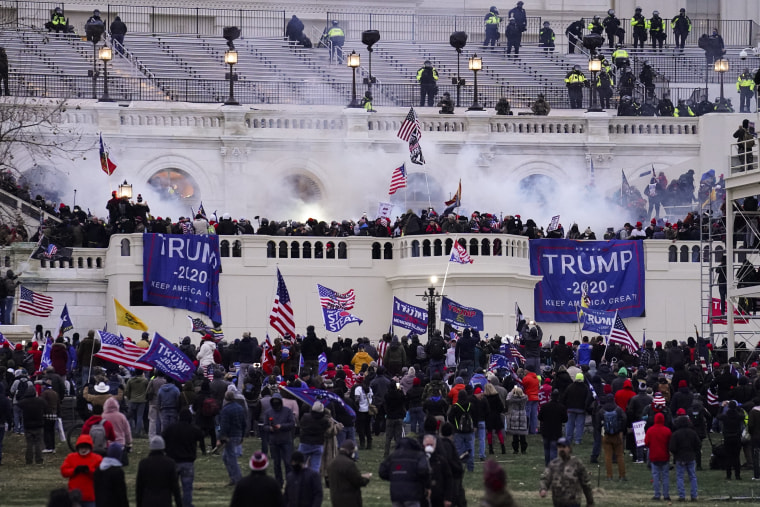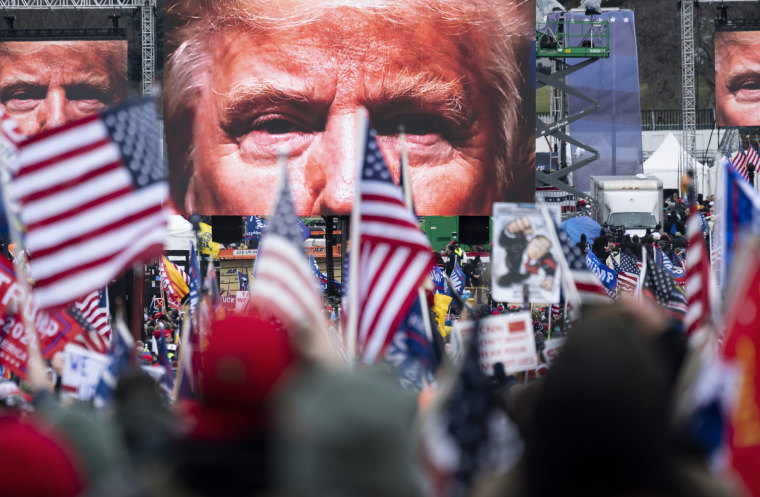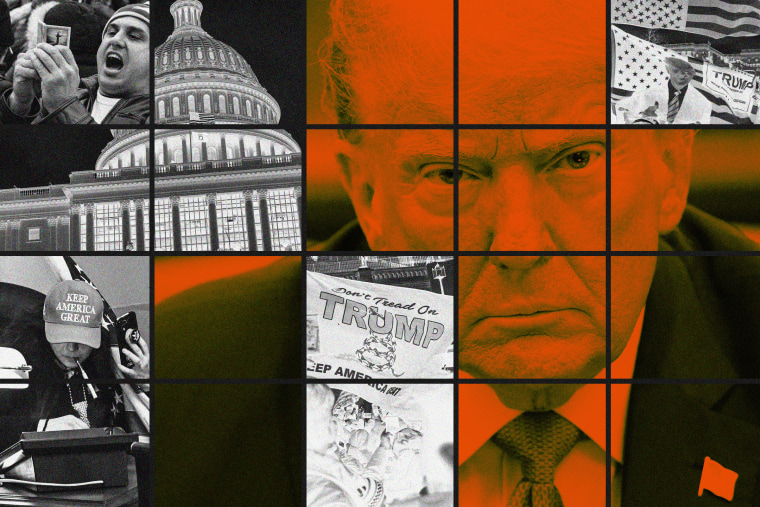WASHINGTON — For the past three years, defense lawyers seeking leniency for Jan. 6 rioters have often struck a similar theme in trying to explain to federal judges and Washington juries how their clients fell for thoroughly debunked lies about the 2020 presidential election.
They argued that their clients weren’t very smart or that they had conditions that made them vulnerable to disinformation.
In court filings and sentencing memos, lawyers defending Jan. 6 rioters have argued that their clients were duped and manipulated, that they were poorly educated, had low IQs and lacked critical thinking skills. They wanted former President Donald Trump’s “respect” and “approval” and thought they were “following presidential orders,” lawyers argued. Some Jan. 6 defendants have even called themselves idiots, lamenting that they were credulous enough to have fallen for what they now see as obvious lies.
The strategy appears to have had an impact in some cases, with judges agreeing to more lenient sentences, particularly in cases in which defendants appear genuinely remorseful for their conduct and regret that they were so gullible.
But it’s hard to see the same approach working for Trump, who famously called himself a “very stable genius,” as his own Jan. 6 trial nears.
In court filings in connection with special counsel Jack Smith’s election interference case, which could go to trial as soon as March, Trump’s lawyers have gone the opposite route, attempting to give an intellectual spit-shine to his lies about mass voter fraud in the 2020 election. Trump’s worries about election fraud were not knowingly false, they’ve written, but “were plausible and maintained in good faith.” Trump, his attorneys wrote, had “reasonable concerns about the integrity of the 2020 election,” and it “was not unreasonable at the time, and certainly not criminal, for President Trump to disagree with officials now favored by the prosecution and to rely instead on the independent judgment that the American people elected him to use.”
In a filing to the U.S. Circuit Court of Appeals for the District of Columbia this week, Trump’s attorneys went further, writing that there are “vigorous disputes and questions about the actual outcome of the 2020 Presidential election — disputes that date back to November 2020, continue to this day in our nation’s political discourse, and are based on extensive information about widespread fraud and irregularities in the 2020 election.”
 Supporters of President Donald Trump storm the Capitol on Jan. 6, 2021.John Minchillo / AP file
Supporters of President Donald Trump storm the Capitol on Jan. 6, 2021.John Minchillo / AP file
Courts widely rejected Trump’s claims about mass election fraud in the lead-up to Jan. 6, 2021, and judges in Capitol riot cases have shown frustration and astonishment that so many Americans — many of whom led law-abiding lives before the attack — were, as Senior U.S. District Judge Reggie B. Walton put it, “gullible enough to accept a lie and act on that lie.” Jurors, likewise, haven’t shown much sympathy for criminals who fell for election lies, nor for Trump surrogates who spread them.
Trump — who has bragged about his Ivy League education at the Wharton School at the University of Pennsylvania and who has described himself as “a very smart guy” with “a very good brain” — obviously wouldn’t like his lawyers arguing that he lacked the mental capacity to distinguish internet disinformation from reality.
There are plausible arguments that Trump might have actually believed the election was stolen. He had a track record of disputing Mitt Romney’s election loss in 2012 (when he said the 2012 election was “a total sham” and called for “a revolution,” encouraging his fellow Romney supporters to “fight like hell” and “march on Washington and stop this travesty”), and he falsely contended that “illegal votes” prevented him from beating Hillary Clinton in the popular vote in 2016 (he lost, by nearly 2.9 million votes). Trump also has a history of appearing to believe and promoting internet misinformation, particularly about issues of race; he rose to political prominence by promoting the lie that former President Barack Obama was born in Kenya (a claim he promoted for years, only to walk it back under pressure in 2016).
But there’s a practical reason Trump’s lawyers can’t have trouble arguing that he fell for misinformation: Willful blindness, the Supreme Court ruled years ago, isn’t an excuse.
That Trump knew — or should have known — that the falsehoods he spread were, indeed, false is a critical part of Smith’s federal indictment against him. The indictment alleges that Trump knew the claims were false but “repeatedly and widely disseminated them anyway — to make his knowingly false claims appear legitimate, create an intense national atmosphere of mistrust and anger, and erode public faith in the administration of the election.” Trump’s state of mind “will be a key issue at trial,” Smith’s team wrote in a memo last month.
 Trump urged his supporters to “fight like hell” at a speech before the Capitol attack.Bill Clark / CQ Roll Call via AP file
Trump urged his supporters to “fight like hell” at a speech before the Capitol attack.Bill Clark / CQ Roll Call via AP file
Smith’s team could even win convictions by convincing jurors that Trump was willfully blind to the fact that he lost the 2020 election, and prosecutors can call upon his own former aides, appointees and campaign officials to illustrate that he was repeatedly presented with overwhelming and credible evidence that he had lost.
That leaves Trump’s lawyers cornered.
“In essence, many of the Jan. 6 participants have said that they were useful idiots,” said NBC News legal analyst Joyce Vance, a former top federal prosecutor. “Trump literally cannot do that.”
“I think he’ll be forced, if he goes to trial, to rely on this defense that he honestly believed he had won the election,” Vance said. “The government’s evidence is so very strong to the contrary that it is hard to believe that a jury would credit that, but of course, he only has to play to one juror, so that will likely be the strategy.”
Jon Lewis, a research fellow at the Program on Extremism at George Washington University, said it would also be much less credible for Trump to make the types of claims that he has seen in tracking the more than 1,200 cases against Jan. 6 rioters.
“It is certainly fair to say that a lot of them were useful idiots. Whether it’s the people who claimed rather convincingly that they didn’t know there was an election certification, that they didn’t know what building it was, that they didn’t have a clearly defined grasp of the finer points of congressional parliamentary procedure,” Lewis said.
“The s—, the rhetoric, flows down the hill,” Lewis said. “The guy at the top can’t also claim that he didn’t know what was going on there, too.”
Trump’s lawyers are still giving it their best shot, suggesting in court filings that Trump was concerned about foreign interference with the 2020 election, though he didn’t articulate that argument at the time, rather than the baseless, debunked conspiracy theories about domestic election theft he was articulating over and over again in public.
Trump also plans to argue that a Nov. 12, 2020, statement from the Cybersecurity and Infrastructure Security Agency — which called the 2020 election the “most secure in American history” — was actually “part of a partisan effort to provide false assurances to the public that outpaced the government’s understanding of the situation,” his lawyers wrote. That statement led Trump to fire Christopher Krebs, whom he had appointed to head the agency in 2017.
Trump still purports to believe he won the 2020 presidential election, and plenty of other Jan. 6 defendants still believe that’s true. But some of those who were prosecuted for following through on those lies now say they’ve seen the light.
“I am someone who made the stupidest decision of my life because I was gullible enough to believe the lies of people who were using me for their own aggrandizement,” Gabriel Chase, a college student affiliated with the far-right America First movement, wrote before a judge imposed a probationary sentence in his misdemeanor case.
A federal public defender — whose client recorded himself smoking marijuana inside the Capitol — told a judge that his client wanted to learn how to “critically think” to avoid being misled by “people that are portrayed as highly intelligent, high-ranking officials.” Another team of defense lawyers representing Peter Schwartz, of Pennsylvania, wrote in a sentencing memo that he was “motivated by a misunderstanding as to the facts surrounding the 2020 election,” adding: “There remain many grifters out there who remain free to continue propagating the ‘great lie’ that Trump won the election, Donald Trump being among the most prominent.”
Other lawyers have offered up a host of reasons and conditions that made Jan. 6 defendants susceptible to internet disinformation spread by Trump and GOP allies, telling the courts about diagnoses of post-traumatic stress disorder, bipolar disorder, anxiety, attention deficit/hyperactivity disorder or learning difficulties or saying their clients were on the autism spectrum. They’ve brought up addictions to alcohol and drugs or difficult upbringings that left their clients growing up without strong male role models.
 Oath Keeper Jessica Watkins called herself an “idiot” in court testimony.U.S. District Court for Washington, D.C.
Oath Keeper Jessica Watkins called herself an “idiot” in court testimony.U.S. District Court for Washington, D.C.
In some cases, Trump was relying on the same people who spread lies about the election that led his supporters to attack the Capitol.
“Sidney Powell got me fired up,” Doug Jensen — a QAnon supporter and Capitol rioter who believed he was storming the White House — said in an interview with the FBI. Powell, a far-right attorney, worked to overturn the election for Trump. She has pleaded guilty in the Georgia election interference case and appears to be one of the unindicted co-conspirators listed in Trump’s federal election interference indictment.
Ray Epps, who has been the target of internet misinformation himself, wrote in a letter to the court that he, too, “was gullible and fell for the lie that the election was stolen.” He pleaded guilty to one count of disorderly or disruptive conduct on restricted grounds and will be sentenced next week.
Oath Keeper Jessica Watkins, who was found guilty of obstruction of an official proceeding and other crimes, said at her trial that “in hindsight, I feel like I was gullible.”
At her sentencing in May, Watkins said she had been watching “a steady diet” of Infowars and Alex Jones before the Capitol attack, hearing misinformation like “Dominion servers were being invaded by the Chinese.” Watkins said she still had questions about the 2020 presidential election but knew she had to be held accountable for her conduct.
“I was just another idiot running around the Capitol,” Watkins told the judge before she was sentenced to 8½ years in federal prison. “But idiots are held responsible.”
![]() Ryan J. Reilly
Ryan J. Reilly
Ryan J. Reilly is a justice reporter for NBC News.

